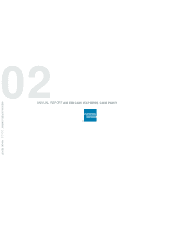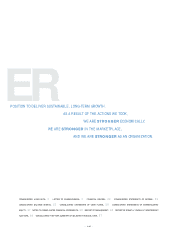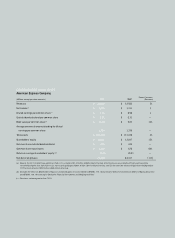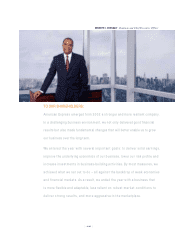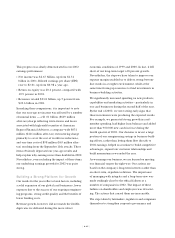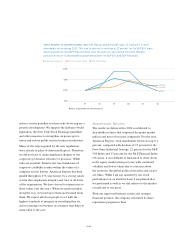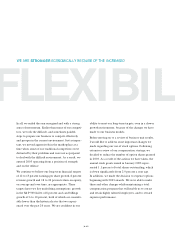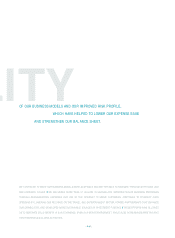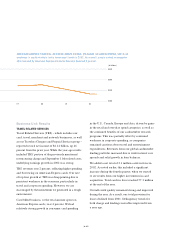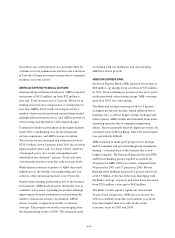American Express 2002 Annual Report Download - page 11
Download and view the complete annual report
Please find page 11 of the 2002 American Express annual report below. You can navigate through the pages in the report by either clicking on the pages listed below, or by using the keyword search tool below to find specific information within the annual report.
Growth in our card businesses was partially offset by
a decline in travel commissions and fees and a decrease
in Travelers Cheque investment income due to continued
weakness in travel activity.
AMERICAN EXPRESS FINANCIAL ADVISORS
American Express Financial Advisors (AEFA) reported
net income of $632 million, up from $52 million a
year ago. Total revenues rose 17 percent. However, in
making year-over-year comparisons, it is important to
note that AEFA’s 2001 results were depressed by a
number of previously mentioned unusual items includ-
ing high-yield investment losses, and AEFA’s portion of
restructuring and September 11th-related charges.
Continued volatility and weakness in the equity markets
made 2002 a challenging year for most financial
services companies, and AEFA was no exception.
Total assets owned, managed and administered were
$230.6 billion, down 9 percent from 2001 due to lower
equity market values and, to a lesser extent, outflows
of managed assets. As a result, management and
distribution fees declined 7 percent. Total cash sales
of investment products were flat with year-ago levels.
While human resources expenses at AEFA decreased
slightly due to the benefits of reengineering and cost
controls, other operating expenses rose 19 percent.
Despite weak earnings performance due to the external
environment, AEFA made progress during the year in
a number of key areas: expanding its product offerings,
improving investment performance and growing the
number of financial advisors. In addition, AEFA’s
return on equity compared favorably to industry
averages. The progress we made is encouraging after
the disappointing results of 2001. We remain focused
on dealing with our challenges and repositioning
AEFA for future growth.
AMERICAN EXPRESS BANK
American Express Bank (AEB) reported net income of
$80 million, up sharply from a net loss of $13 million
in 2001. Even excluding its portion of last year’s previ-
ously mentioned restructuring charge, AEB’s earnings
growth in 2002 was outstanding.
The Bank had strong revenue growth of 15 percent
on higher net interest income, which reflected lower
funding costs, as well as higher foreign exchange and
other revenue. AEB’s results also benefited from lower
operating expenses due to ongoing reengineering
efforts. This was partially offset by higher provisions for
consumer losses in Hong Kong, where the environment
was particularly difficult.
AEB continued to make good progress in its strategic
shift to consumer and private banking from commercial
lending – a reorientation of the business that is now
largely complete. The Personal Financial Services (PFS)
and Private Banking groups together accounted for
49 percent of AEB’s 2002 net revenue, compared with
46 percent in 2001 and 37 percent in 2000. Private
Banking client holdings increased 12 percent and stood
at $13.9 billion at the end of the year. In keeping with
the Bank’s strategy, corporate and other loans decreased
from $926 million a year ago to $483 million.
The Bank’s results signal a significant turnaround.
To put it into perspective, AEB’s pre-tax income for
2002 in a difficult economic environment was about
four times higher than its results in the robust
economic years of 1999 and 2000.
I9AXPI

